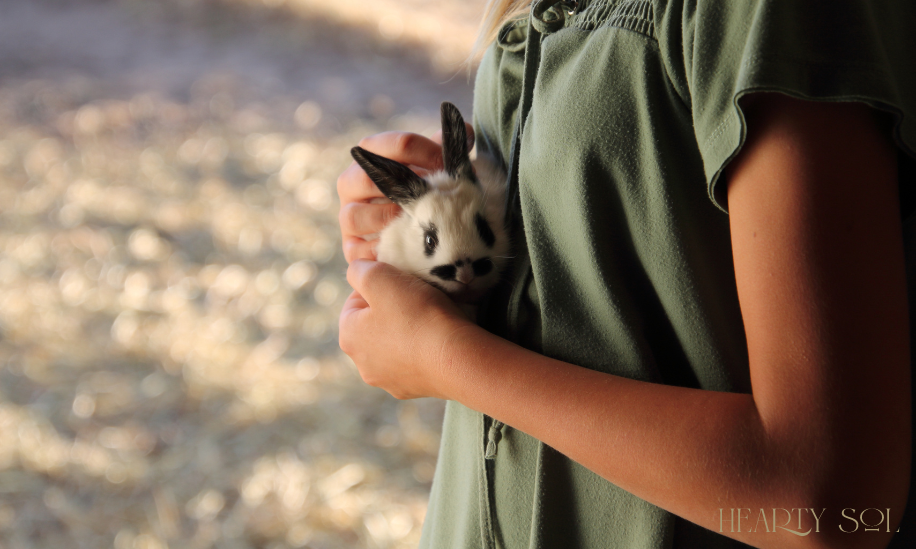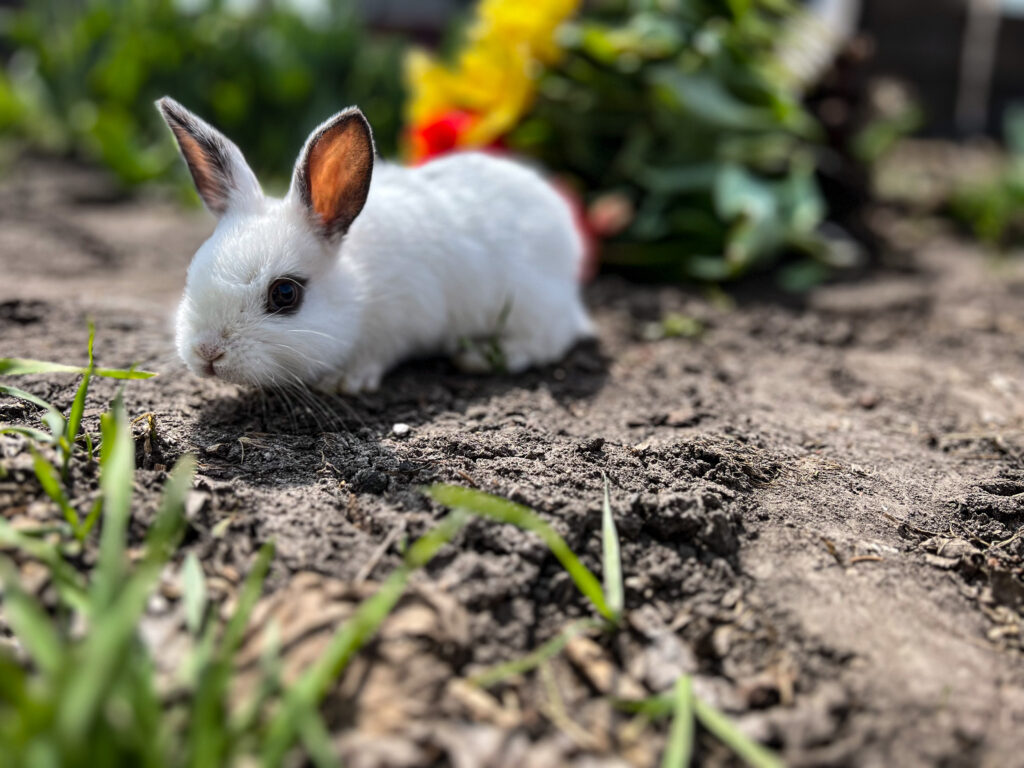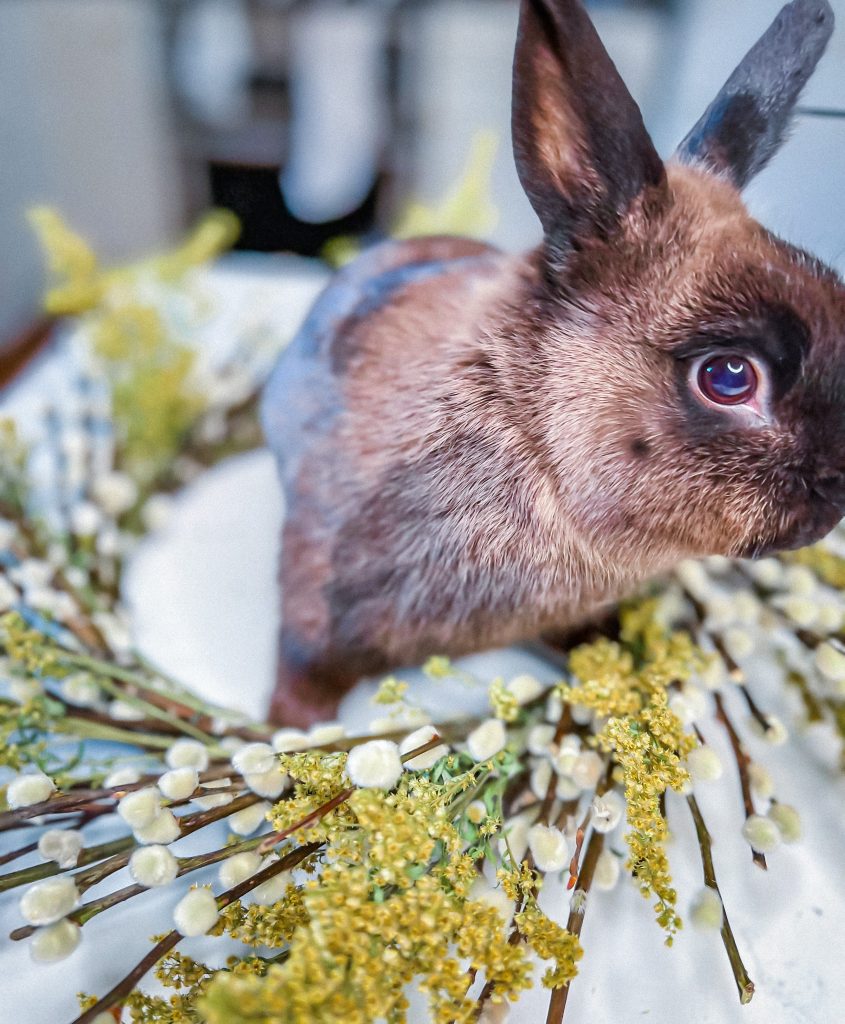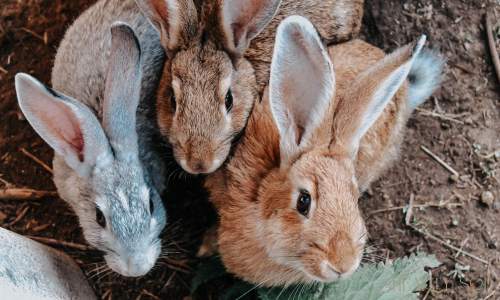How to Care for an Outdoor Rabbit | Bunny 101
Bunny are adorable creatures that make great pets, but just like any other animal, taking care of them requires commitment and effort. Here are our most asked bunny care tips!
They require a lot of care, love, and attention to live a healthy and happy life. Knowing how to care for a new animal before bringing it to your farm or home is super important!

Bunnies on our Farm
We have had a bunny around for a few years now. At first it was really by accident. Some friends of ours had a couple extra and they needed a home. They were cute and snuggly and it was spring so bring on all of the cute baby animals right? We had a lot to learn when it came to this new species and I wished I had a comprehensive list to help us through those first few weeks with our new bunnies.
Caring for a new species is new and interesting, but it is best to know what you’re getting yourself into before you bring on a new animal.
Our Best Bunny Care Tips!
Housing for your Bunny
Provide the right living space Bunnies need a safe and comfortable living space. A rabbit hutch with enough space for the bunny to move around is essential. Make sure the hutch has a solid floor to avoid foot problems and wire bottoms that can cause sore hocks. Also, ensure that the hutch is in a dry, warm, and draft-free area.
What do I feed my new Bunny?
Feed them the right food Bunnies need a well-balanced diet that includes hay, fresh vegetables, oats and fruits. Hay is essential in their diet, as it helps keep their digestive system healthy and provides them with the necessary fiber. Offer your bunny fresh vegetables like kale, carrots, and lettuce. However, be careful not to overfeed them as overeating can cause health problems.
Provide fresh water Fresh water is essential for your bunny’s health. Make sure they have access to clean, fresh water all the time. Use a water bottle or a bowl to give them water.
Rabbit Entertainment
If your bunny is outside and allowing to roam around the yard, they will keep themselves entertained. But if the bunny is inside, you’ll want to make sure they are entertained in some way.
Bunnies are social animals that need lots of mental stimulation. Offer them toys like chew sticks, balls, and tunnels to keep them entertained. Also, make sure to spend time with them daily, play with them, and offer them cuddles.
Having another bunny pal living with your bunny, might also keep them company.
If a rabbit doesn’t have something to entertain it’s self, it may get into trouble. For instance ours decided to start chewing on his food bowl. Once we recognized this, we added a few jingly cat toys to his cage and he was content again!
Grooming and Health of a Rabbit
Grooming Bunnies have delicate fur that needs regular grooming. Brush their fur regularly to remove any loose hairs that can cause hairballs. Also, clean their ears and eyes regularly to avoid any infections.
Health Check Bunnies need regular checkups to maintain their health. Take them to the vet regularly for vaccinations and to check their overall health.
If you have pairs or multiples of bunny, decide whether you would like to have more bunnies, or if what you have is enough. Rabbits can and will multiply very quickly and are reproductive at a very young age. So decide early.
How to Keep your Bunny Safe:
Keep them safe Bunnies are curious animals that like to explore. Ensure that they are safe from predators, electrical wires, and any harmful objects. We will often create a tunnel around our garden with chicken wire, so our bunny can safely be out and about while we are in the garden working. We know her droppings are helping our flowers and plant grow up too, so compost away, little one!
Taking care of a bunny requires dedication, patience, and love. Follow these tips to ensure your bunny lives a healthy and happy life. With proper care, your bunny will become a loving and loyal companion.

Why You’ll Love adding a Bunny to your home or farm
- Natural Fertilizer: Bunny manure is an excellent source of natural fertilizer. It is rich in nitrogen, phosphorus, and potassium, which are essential nutrients for plant growth. Adding bunny manure or compost tea to your garden or crops can help boost their growth and health.
- Pest Control: Bunnies are natural grazers that love to eat grass and weeds. They can help control weeds and keep the grass in your lawn or pasture well-maintained.
- Education: Bunnies can be a great educational tool for kids and visitors to your farm. They can learn about their unique behaviors, how to care for them, and the role they play in the ecosystem.
- Companionship: Bunnies can be great companions for farmers and their families. They are friendly, curious, and enjoy human company. They also provide an opportunity for a fun bonding experience with children.
- Sustainability: Raising bunnies for their meat, fur, and manure can be a sustainable and eco-friendly way to utilize your farm. Bunny meat is a lean protein source and is often used in traditional cuisine. Bunny fur can be used to make clothing and accessories, and bunny manure is an organic and natural alternative to synthetic fertilizers.

Having a bunny on your farm can be a beneficial and rewarding experience. They can help improve your soil health, keep your grass well-maintained, and provide a fun and educational experience for visitors and children. They also offer a chance for companionship and a sustainable way to utilize your farm’s resources. Read more about the Benefits of Keeping a Backyard Bunny here!

What Can I do with a Bunny?
There are many things you can do with a rabbit, depending on your interests and goals. Here are some ideas:
- Pet: Rabbits can make excellent pets. They are affectionate, social, and can be easily trained to use a litter box. They also have unique personalities and can provide companionship and entertainment.
- Show: If you have a purebred rabbit, you can show them in local or national rabbit shows. Showing rabbits can be a fun and competitive hobby and can also help you connect with other rabbit enthusiasts.
- Breeding: If you have a pair of rabbits, you can breed them to produce litters of baby rabbits. Breeding rabbits can be a way to create a sustainable food source, or to produce rabbits for sale as pets, show rabbits, or breeding stock.
- Meat: Rabbit meat is a lean protein source that is often used in traditional cuisine. If you have a rabbitry, you can raise rabbits for meat production. However, it is essential to ensure that the rabbits are raised and processed humanely.
- Fur: Rabbit fur can be used to make clothing and accessories. If you have a breed that is known for their fur, you can harvest the fur after the rabbit has passed away, or you can carefully shave it.
- Therapy: Rabbits can be used in animal-assisted therapy to help people with mental or physical health issues. Rabbits can provide a calming and soothing presence and can help reduce stress and anxiety.
- Rabbit Compost Tea: Rabbit tea is a highly rich, natural fertilizer for your plants and garden and is super easy to make! Read all about how we make Rabbit Compost Tea in this blog!
Rabbits can provide a variety of opportunities, including companionship, showing, breeding, meat production, fur harvesting, and animal-assisted therapy. Whatever your interests and goals, there is likely a way to incorporate rabbits into your life in a meaningful and rewarding way. Read more about why we chose to have a Garden Bunny in this post!

Questions People are asking about Bunny Care
We prefer to have our bunny poop right into the straw bedding, so we can use this in our garden, but if your bunny is strictly indoors, you can train your bunny to go in a little box. To encourage them to use it, place some of their droppings in the litter box and cover it with a small amount of litter. Whenever you see your bunny use the litter box, praise and reward them with a treat or some extra playtime.
When it comes to bunny care, they can be prone to gut stasis, respiratory infections, dental problems, flystrike, E.cuniculi and Myxomatosis. The more time you spend with your bunny, the better acquainted you’ll be with normal and unusual behaviors. If something seems off, it probably is. Best to visit with a Vet if you have questions about your bunny’s health.
Other Rabbit Blog Posts:
Outdoor Garden Rabbit Guide | The Benefits of Keeping a Backyard Rabbit
How to Make Composted Rabbit Tea
How to Care for an Outdoor Bunny | Pin this for later!

Affiliate Disclosure & Content Disclaimer
This post may contain affiliate links from a paid sponsor, Amazon or other program. When you use these links to make a purchase I earn a small commission at no extra cost to you. This allows me to continue creating the content that you love. The content in this article is created for information only and based on my research and/or opinion.
Emily T.
DAILY INSPIRATION ON THE GRAM @hearty.sol
it's hip to be square!
View comments
+ Leave a comment